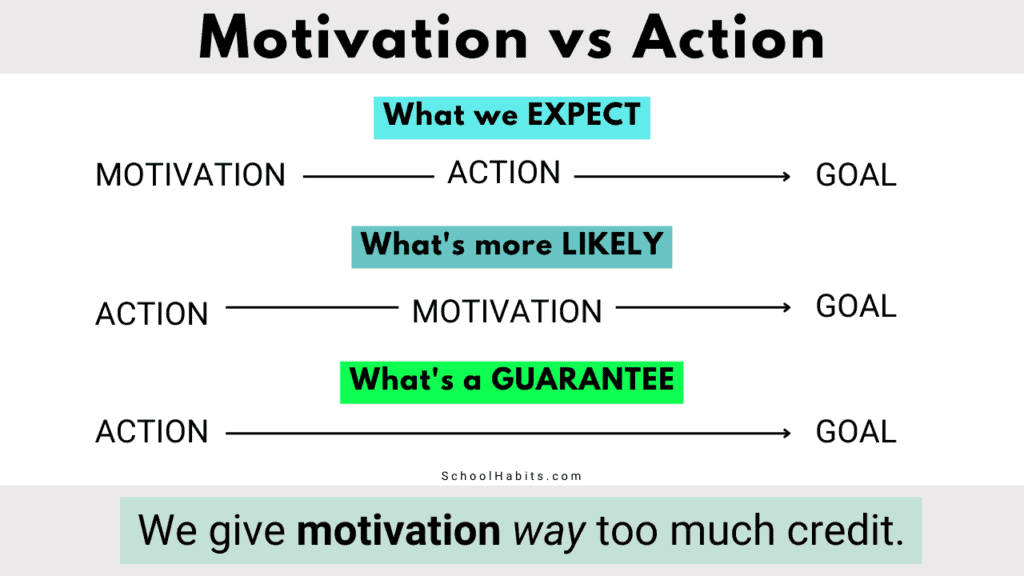
By Katie Azevedo, M.Ed.
This post offers tips and mindset shifts for how to study when you have no motivation. Motivation is a funky topic – one that is often misunderstood and mischaracterized. As I explain in detail below, in many cases motivation is a luxury. We must start with this baseline understanding. It is powerful, it is helpful, but it is not required to do things.
How to study when you have no motivation: 13 tips
I’ve organized 13 study motivation strategies into two categories. First, you’ll find 10 strategies to increase novelty and urgency, two primary ingredients for motivation. Second, you’ll find 3 study tips that are mindset-based. Why? Because so much of motivation is mindset. Also, this Reddit thread about studying with no motivation is fascinating.
10 tactical ways to increase your motivation to study
The following tips and tricks can help increase your motivation to study by harnessing the power of novelty and urgency. If you think your low motivation is due to the fact that you don’t know how to do something, you need these 5 tips here.
1. Assess and address the cause.
Sometimes there’s an obvious reason for low motivation. Are you tired? Hungry? Anxious? Distracted by other matters? Studying is a cognitively demanding process, one that can’t be done if you’re tired, hungry, anxious or thinking about other things. If your low motivation is easily addressed with a snack or a brisk wake-me-up walk, then do that.
However, if your low motivation is due to something chronic like depression or anxiety, you need to seek help from a medical professional. We’ve long known that the “neurotransmitter dopamine (DA) has a crucial role in motivational control – in learning what things in the world are good and bad, and in choosing actions to gain the good things and avoid the bad things” (Bromberg-Martin, Ethan S et al.). Biological and medical reasons for low motivation are beyond the scope of this post.
2. Make a study schedule
Clarity is the enemy of procrastination. In other words, the more clarity we have about something, the more we can visualize ourselves doing it… and the more likely we’ll actually do it. Instead of thinking “I have to study on Saturday,” make a detailed plan of what you’ll study, when you’ll study it, for how long, and where. This is exactly how to make a study schedule.
3. Tackle one topic at a time
This motivation strategy naturally follows the one above. Once you make a study schedule, you will have a more digestible timeline for studying. Keep in mind that when something is too “big” or vague for our brains to visualize, our motivation tanks. If you know, for example, that you’ll be studying Chapter 1 on Tuesday and Chapter 2 on Wednesday, your brain will see it as a doable task. This in turn can increase your motivation to study.
4. Break down the task into micro-steps
Once you create a study schedule (tip 2) that considers one topic at a time (tip 3), it’s time to break down your study plan further. If we use the example in the previous paragraph – that you’ll study Chapter 1 on Tuesday – you need to figure out what that means. Will you start with vocabulary? Will you start by making flashcards, rewriting your notes, or doing practice questions? Once you get specific, you can figure out the micro-steps involved. For example, if you’re going to start with flashcards, here are your micro-steps:
- Get flashcards
- Gather materials that contain the information to put on the flashcards
- Write the information on the flashcards
- Study the flashcards using one of these methods
5. Set a timer
To increase study motivation with urgency, give your brain a predetermined ending time. We can rally and endure difficult tasks when we know when they’ll end. I suggest you study for no more than 45-60 minutes before taking a break. Here’s the best way to spend your study break.
You could also frame your study sessions using the Pomodoro Technique. When you have no motivation to study, game-ifying the task with the Pomodoro Technique can work wonders.
6. Get rid of distractions
You know this. You’ve read it before, heard it before, and deep down inside you know it’s true. But, have you actually tried it? Have you ACTUALLY put away your phone (and your friends!) and shut down your tabs? I dare you.
7. Switch up your study time and location
We can increase our motivation to study by adding novelty, and one way to do this is by studying at a different time and location than usual. Do you typically study in the kitchen after lacrosse practice? Try studying in your local public library on Saturday at 3:00.
8. Form a study group
It’s easier to study when you have no motivation … if you have accountability. If you know you’re meeting three friends to study after school, you’ll show up regardless of how motivated you feel. (More evidence that motivation is often irrelevant to getting the thing done.) I always suggest that you first study independently and then form a study group, but if you can’t even bring yourself to study your materials alone, start with the group session. Here are my top strategies group study sessions that work.
9. Do parallel work with someone
If it’s impractical to form a study group because your classmates don’t live close by or you have different schedules, plan a parallel study or work session with someone not in your class. You don’t have to be studying the same material, but you just have to be studying in the same room and have similar goals.
10. Make it a habit to study at the same time each day
This motivation strategy won’t work in a pinch, but it’s one that works over time. If you make it a habit to do homework and study at the same time each day, you’ll program your mind to expect the task. When you expect the task, it’s no longer a decision you have to make in the moment.
How to increase your motivation to study with mindset shifts: 3 strategies
While motivation can have biological and chemical factors, the day-to-day motivation dips we feel are normal. Nobody is motivated all the time. The key to how to study when you have no motivation is MINDSET. No, this isn’t woo-woo hocus pocus stuff. It’s real. If you really want to shift your thinking, when you’re done with this post, you should read this one.
1. Stop relying on motivation
I want to shout this from the rooftops. We have to stop relying on motivation. Motivation is a luxury that can be powerful and magical, but it’s not an essential ingredient to starting something. We have a misconception that motivation comes first, and then action. But in reality, action (just starting!) leads to motivation.

2. Acknowledge the truth that studying is hard
Studying is supposed to be uncomfortable. If you’re doing it right by using active recall, it can actually be quite unpleasant. And, it’s normal to want to avoid things that make us feel icky. The strategy here is to stop expecting studying to be warm and fuzzy. It’s not. So when we lower our expectation of what it’s “supposed” to feel like, we won’t be so turned off by the discomfort it causes us. Sometimes hard things are just hard things.
3. Find relevance
We are not motivated to do tasks that we find irrelevant. This is normal. Unfortunately, some of the things we study in school may not seem relevant, and this makes us unmotivated to study them. In these cases, when you’re thinking when will I ever have to know this when I’m older?! you have two choices. First, find the relevance. Force it. Make a connection of any kind to your real life. Second, if you truly can’t find relevance, do it anyway knowing that it works your “doing it anyway” muscle. One of the most valuable lessons from school is how to do things when we don’t want to.
If you’re really struggling with a particular class, then you need these 6 strategies for handling a class you hate. If you don’t hate the class but it’s just superrrrrr hard, then use these 10 tips for managing hard classes.
Here are my top 5 tips for staying motivated until the end of the school year.
Source cited: Bromberg-Martin, Ethan S et al. “Dopamine in motivational control: rewarding, aversive, and alerting.” Neuron vol. 68,5 (2010): 815-34. doi:10.1016/j.neuron.2010.11.022

